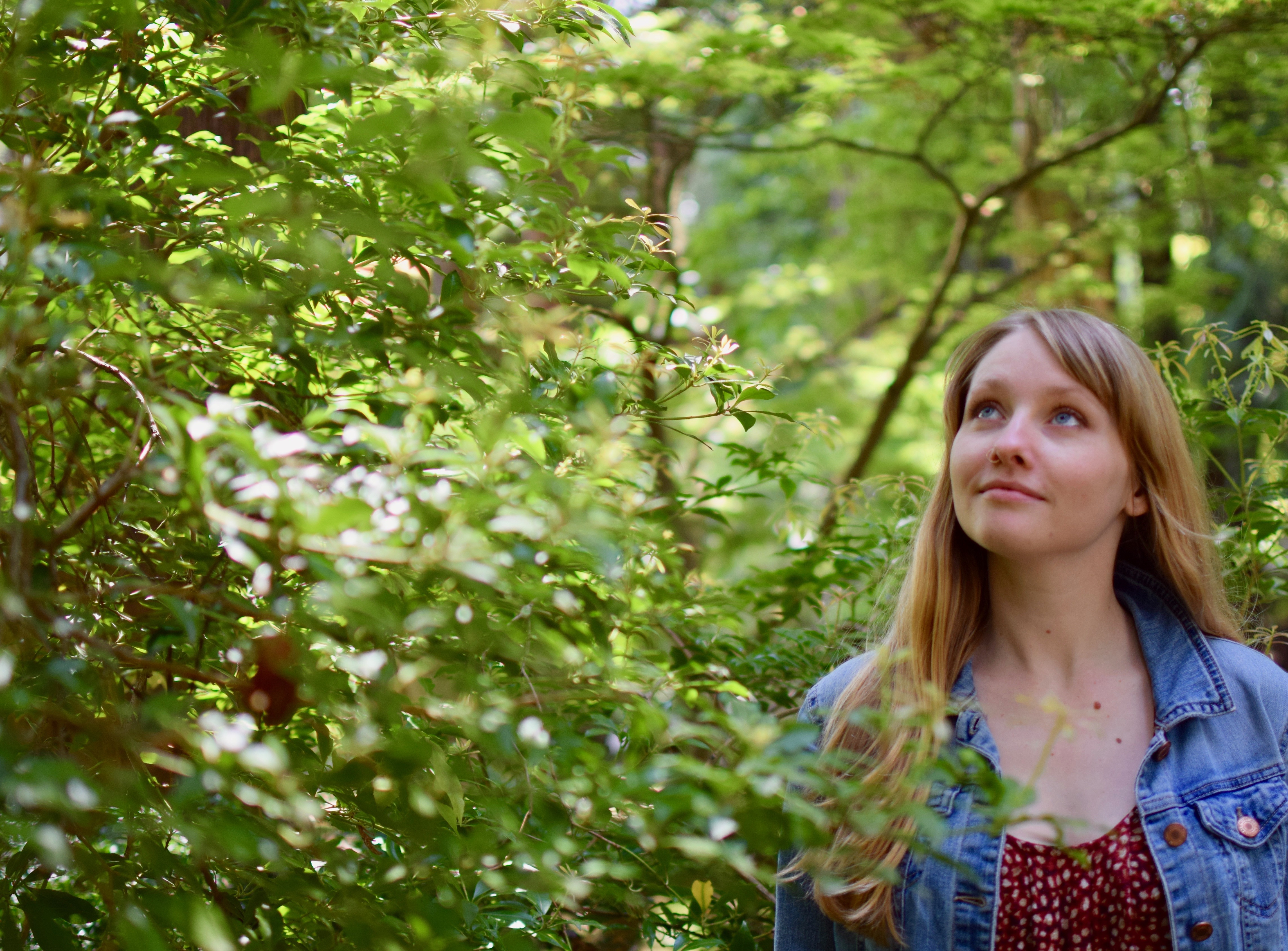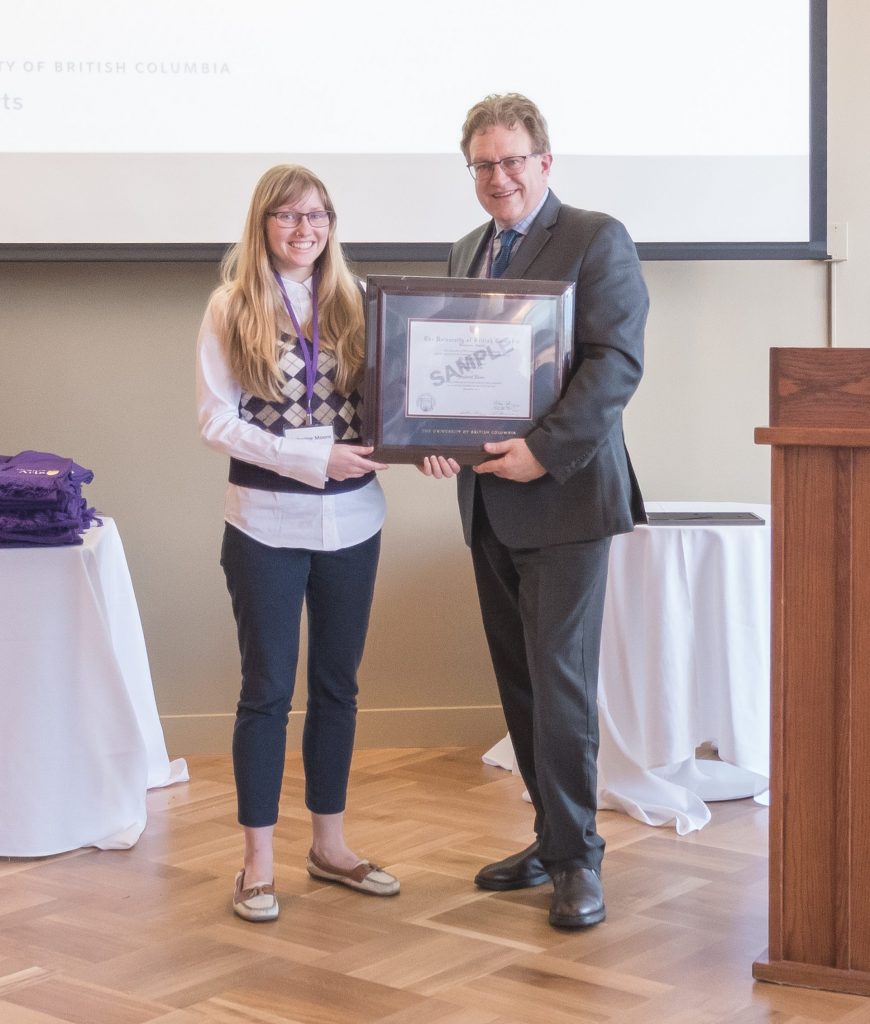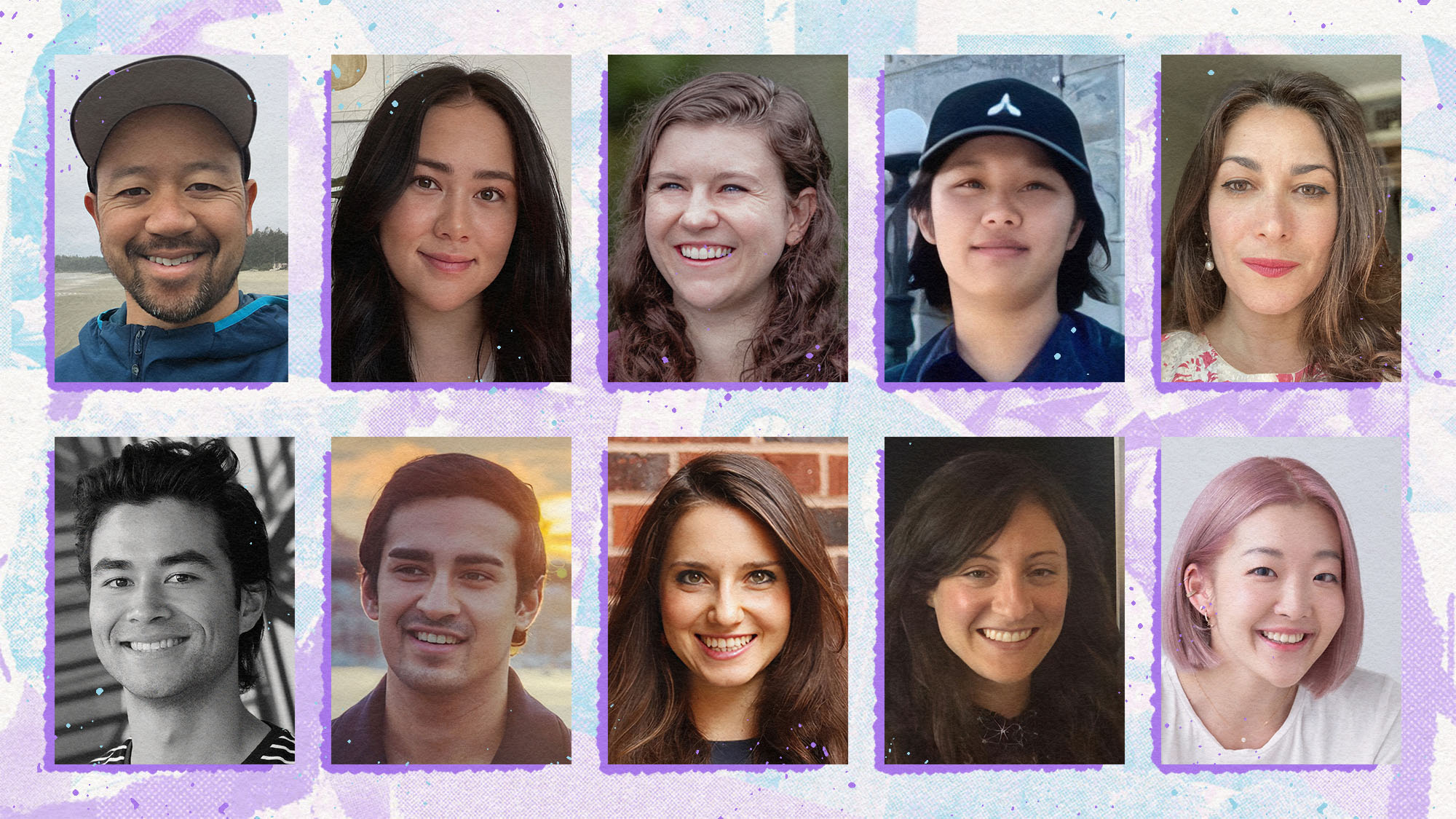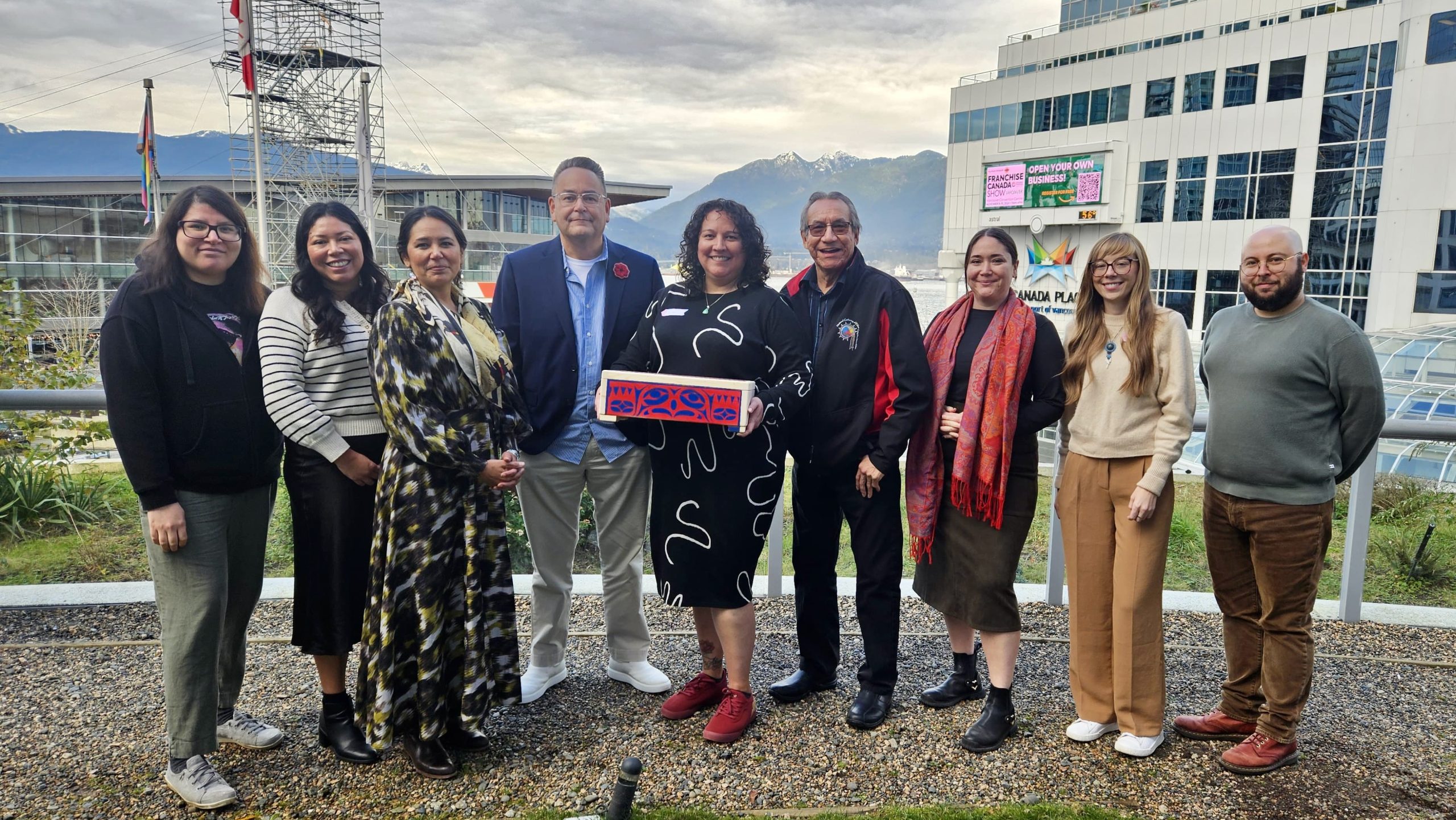



In spring 2018, UBC Psychology student Katherine Moore received the Faculty of Arts’ “Outstanding Leader in the UBC Community and Beyond” award for her contributions to mental health culture on campus and in the wider community. During her time at UBC, Katherine founded the UBC Positive Psychology Club and the Healthy Minds | Healthy Campuses Student Network – aiming to improve campus culture around mental health.
She was also a political activist for youth mental health, presenting her vision to hundreds of high-school students, while advocating for mental health policy with politicians and non-profit CEOs. She helped guide the work of First Call: BC Child and Youth Advocacy Coalition as a member of their board of directors, and contributed three chapters to a mentors training guidebook to help volunteers who support at risk youth throughout B.C. Katherine also worked as a research assistant at several UBC labs and co-authored a successful Teaching and Learning Enhancement Fund application.
We asked her to reflect on some of her most meaningful UBC experience and challenges and share some parting words of wisdom for fellow Arts students.
Hometown: Sudbury, Ontario
Program of Study: Bachelor of Arts in Psychology
UBC Affiliations: President of the UBC Positive Psychology Club, Research Assistant at the UBC SHINE Research Lab, Co-applicant Interactive and Extensible Educational Modules for Living in a Diverse World Project
Awards: UBC Valedictorian, Bhagwan Kaur wife of Gokal Singh of Halwara Award in Arts, Westbrook Scholar, Katherine Brearly Arts Scholarship, Trek Excellence Scholarship, Summer Session Student’s Scholarship, Chancellors Scholar.
Where can we connect with you? You can find me on LinkedIn or Twitter.
How did you choose your academic program?
Early on in life, I noticed I was skilled at helping friends resolve their interpersonal issues, and I derived a lot of joy from it. This sparked the idea of becoming a psychologist, but when I was choosing what to do after high school, I didn’t feel I belonged in university. So I decided to follow my interest in physical health instead. However, when I was a personal trainer I began to suspect that some of the physical issues my clients were hoping to address might stem from psychological issues, like an unhelpful belief system or a deeply ingrained psychological pattern. My qualifications prevented me from providing psychological counsel, so I decided to go back to school and fulfill my dream of becoming a psychologist. Shortly afterwards I enrolled in an undergraduate degree in psychology.
What were some of the most meaningful experiences you had at UBC?
Overall, I think the most meaningful experience I had at UBC was being exposed to the resource-rich environment the university offers. The students are sharp, which encouraged me to work harder, and the professors are deeply knowledgeable and experienced, which helped me learn what was relevant in my field of interest. However, a few professors truly enriched my experience:
- Dr. Rhea Owens, who runs the SHINE Lab – now at the University of North Dakota – displayed true egalitarian and altruistic leadership as a supervisor. It’s because of her willingness to share success that I was able to give a conference presentation at the 5th World Congress on Positive Psychology, co-author three chapters in a handbook on mentorship and co-author the introductory chapter to a special topics book about positive psychology (to be submitted).
- The Assistant Head of the Department of Psychology, Dr. Steven Barnes deserves considerable credit in making my experience at UBC meaningful as well. As a student in his class, I witnessed the extent to which a professor could care for the quality of their teaching, as well as deep caring for student success. Dr. Barnes always made me feel supported and encouraged me to try new things. As a result, I was able to co-author two academic papers with him (as well as other colleagues), and become a co-applicant on his TLEF project.
- Lastly, working for Dr. Elizabeth Dunn as her Lab Manager in my first year at UBC was instrumental to the rest of my degree. Dr. Dunn believes in the capacity of her students and treats them as if they are highly capable and skilled. She has high expectations of her students, which encouraged me to work hard to meet them. It was difficult working for her, but I came out much more capable than when I started. This helped me tackle everything that came my way throughout the rest of my degree.


Dr. Gage Averill and Katherine Moore; recipient of the Outstanding Leader in the UBC Community and Beyond award
What were your biggest challenges, and how did you overcome them?
My parents don’t have post-secondary educations, and when I was in high school, I didn’t read books, the people around me didn’t discuss politics or current events and overall I wasn’t interested in school. Because of this, I was highly unprepared for university. I didn’t understand our political system or know what a non-profit organization was, and struggled to read and write at a university level. This made me feel incredibly inadequate and isolated from my peers.
However, the fear I felt about not knowing as much, or being as capable, as my peers fuelled me to close the gap between them and myself. It was painful, but I spent lots of extra time outside of my schoolwork googling what the qualifications were for an organization to be considered a non-profit, asking my peers to define words they used that I didn’t understand, and reading the news to get a sense of what the people around me were talking about. I worked really hard to make myself feel like I was just as capable as I perceived my peers to be. In the end I not only began to feel more confident in myself, but I started developing habits that I believe helped me excel later on. Although, I must admit that my vocabulary could still use some work!
How do you find a balance between involvement and academics?
To be honest, I don’t think I had a balance between involvement and academics. In my first year, I focused mainly on academics because I was so ill equipped for university. In my second year, I started working a few part time jobs and struggled to dedicate enough time to my academics. However, in my 3rd and 4th years I noticed that my ability to read, write and learn material took less time than it had previously. With better academic skills, more time opened up for other volunteer opportunities and I began challenging my limits by taking on more projects.
Each term I would constantly think that I wouldn’t have enough time for all of my commitments. But as each term came to an end, I noticed that my academic performance remained more or less the same. When considering all of this, I suppose a bit of balance was achieved by choosing when it was most strategic to engage in extracurricular work. In my case, that meant focusing more on academics early in my degree to develop skills that would support me while working in the community later on.


What makes a great Arts student leader?
Someone who isn’t afraid of not knowing what they are doing and instead embraces what they don’t know and seeks out ways to remedy their deficit.
What are the top three things every UBC Arts student should do before they graduate?
- Join the Arts Co-op program. This program will help you polish your resume and cover letter, support you through interviews and give you a leg up in finding a job upon graduation.
- Apply to be a Faculty of Arts Student Representative. This will help you feel connected with UBC, give you an opportunity to voice your opinions with faculty as well as staff and offer you a glimpse into the inner workings of UBC.
- Meet our Dean Gage Avril. He is so fun to hang out with.
If you had the chance to re-start your UBC experience, what would you do differently?
If it were at all possible, I would have stressed less. But without the skills and hindsight I have now, I doubt that would be possible. Aside from that, I would have run to be the AMS VP Academic & University Affairs, and joined the AMS Advocacy Committee.
What’s next for you?
I’m going to take some time off of school and so I can focus on enjoying my life in Vancouver to the fullest. In a year or two I intend to come back to UBC and complete an MA in Counselling Psychology. But for now I’ll be working to develop two new service areas (grant facilitation and student engagement) for the Department of Psychology.


